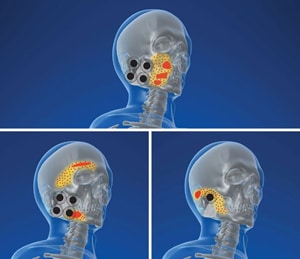Jaw Pain & TMJ Syndrome
TMJ Syndrome is often associated with headaches and earaches.

TMJ Syndrome is often associated with headaches and earaches.

Self Check: Do you wake up with a sore jaw, or headache? Stand in front of a mirror and slowly open your mouth. Does your jaw drop straight down or shift from side to side as you open? If it shifts side to side, TMJ may play a role in your condition.
Pain in or around the jaw when chewing or opening/closing of the mouth can occur with grinding, teeth misalignment, or unequal movement on one side of the jaw.
Pain located in front of the ear, clicking or snapping with jaw movement, abnormal jaw movement and difficulty chewing are all common symptoms associated with abnormal jaw function.
The muscles used in chewing can begin to tighten in response to jaw pain and compress the TMJ. Lengthening and realigning these muscles with ART will decrease the pressure and compression on the TMJ
TMD (Tempomandibular joint dysfunction) is commonly associated with headaches and earaches as well.
The TMJ (Tempomandibular joint is the second most mobile joint in your body!
